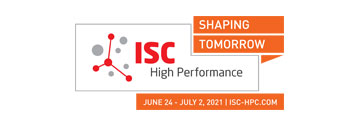Conference
The PASC Conference series is an international and interdisciplinary platform for the exchange of knowledge in scientific computing and computational science with a strong focus on methods, tools, algorithms, application challenges, and novel techniques and usage of high performance computing.
The Conference is co-sponsored by the Association for Computing Machinery (ACM) and the PASC structuring project and it is managed by the Swiss National Supercomputing Centre (CSCS). The local host of PASC21 is the University of Geneva, Switzerland's second largest university.
PASC21 will be held from July 5 to 9, 2021 and it will combine content from the postponed PASC20 Conference together with new contributions.
PASC21
July 5-9, 2021
Digital Event
pasc21.pasc-conference.org
Scope
Theme: New Challenges, New Computing Paradigms
Computational science is crucially important across diverse research communities from traditional topics in physics and chemistry to new applications in life and social sciences.
The drive to exascale computing, together with new computational paradigms in machine learning, artificial intelligence and big data present opportunities for science and society but also significant challenges for both traditional HPC and the new user communities.
This growing community requires increased computing power, new heterogeneous architecture paradigms, new software and new policies for resource access while benchmarks like High-Performance Linpack are becoming less and less representative of the computing ecosystems. Although new hardware solutions are emerging, computers become fatter, not faster, and exploiting the coming exascale systems remains a challenge for many traditional HPC applications.
The conference aims to open discussions on these new challenges, explore problems and propose solutions to address them and shape the future of scientific computing.
Target Audience
The PASC Conference seeks to engage participants from academia, research labs and industry to address important issues in HPC and computational science. PASC21 is inviting researchers from diverse scientific backgrounds to promote interdisciplinary collaboration and exchange of expertise. The conference is an opportunity for researchers in branches of science that require computer modeling and high-performance simulations to discuss computational techniques and technologies.
Program
The technical program of PASC21 is organized around eight scientific domains:
- Climate and Weather
- Chemistry and Materials
- Computer Science and Applied Mathematics
- Emerging Application Domains (incl. but not limited to social sciences, finance)
- Engineering (incl. but not limited to CFD, computational mechanics, computational engineering materials, turbulent flow)
- Life Sciences (incl. but not limited to biophysics, genomics, bioinformatics, systems biology, neuroscience and computational biology)
- Physics (incl. but not limited to astrophysics, cosmology, plasma modelling, QCD)
- Solid Earth Dynamics
The five-day program will include keynote presentations, a plenary panel discussion, an interdisciplinary dialogue, minisymposia, peer-reviewed papers, panels and poster sessions. The conference is co-sponsored by ACM SIGHPC, and full papers will be published in the ACM Digital Library.
Event Partnership
ISC High Performance
ISC 2021 Digital (June 24 - July 2) is the largest community forum in Europe for HPC, ML and data analytics. This year we are using a highly interactive platform to allow 3,500 attendees, exhibitors and speakers to engage in real time as closest as possible to a real-life experience.
Attendees draw value from ISC by learning about new products and technologies, exchanging ideas with their peers, making new connections, and advancing their careers. At the same time, exhibitors will get access to an audience interested in finding the best solutions to their business and research challenges. More info available here.
About the PASC structuring project
The PASC structuring project is supported by the Council of Federal Institutes of Technology (ETH Board). The structuring project has been initiated in 2013 and the second phase will come to completion in 2020.
PASC is coordinated by CSCS, the Swiss National Supercomputing Centre of the ETH Zurich, in collaboration with the Università della Svizzera italiana and with the other Swiss universities and the EPF Lausanne.
The platforms overarching goal is to position Swiss computational sciences in the emerging exascale-era. It is complementary to the supercomputing-hardware-focused elements of the Swiss High-Performance and Networking (HPCN) initiative. The PASC consolidates and builds on the achievements of the High-Performance and High-Productivity Computing (HP2C) project, which supported 13 large-scale projects in the period 2009-2013.
PASC aims to promote joint effort to address key scientific issues in different domain sciences through interdisciplinary collaborations between domain scientists, computational scientists, software developers, computing centres and hardware developers. Thus, PASC builds on the principle of co-design, namely that software codes exploiting the potential of the next generation of computing architectures need to be jointly and interactively developed by these actors throughout the whole value chain.




